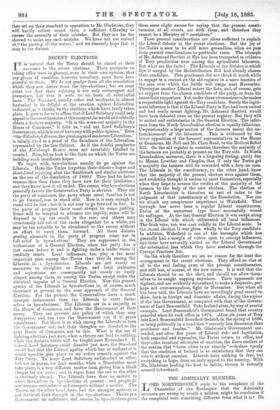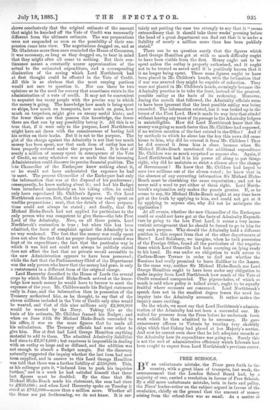THE ADMIRALTY BLUNDER.
LORD NORTHBROOK'S reply to the complaint of the Chancellor of the Exchequer that the Admiralty accounts are wrong by nearly a million might be conclusive if the complaint were something different from what it is. • He
shows conclusively that the original estimate of the amount that might be knocked off the Vote of Credit was necessarily different from the ultimate estimate. The war preparations were not suspended so soon as the possibility of their sus- pension came into view. The negotiations dragged on, and as Mr. Gladstone more than once reminded the House of Commons, it was necessary, so long as they dragged on, to bear in mind that they might after all come to nothing. But their con- tinuance meant a constantly nearer approximation of the actual to the estimated expenditure, and a corresponding diminution of the saving which Lord Northbrook had at first thought could be effected in the Vote of Credit. All this is so obvious that the most carping partisan would not care to question it. Nor can there be two opinions as to the need for secrecy that sometimes exists in the administration of a vote of credit. It may not be convenient to acquaint too many people with the precise way in which the money is going. The knowledge how much is being spent on ships, how much on transports, how much on guns, how much on torpedoes, might give an enemy useful hints ; and the fewer there are that possess this knowledge, the fewer there are that can by any possibility betray it. All this is so true that, if it were only to the purpose, Lord Northbrook might have sat down with the consciousness of having laid his critics on their backs. But it is not to the purpose. The gist of the charge against the Admiralty is not that too much money has been spent, nor that each item of outlay has not been properly entered under the proper head. It is that of nearly a million of money spent in consequence of the Vote of Credit, no entry whatever was so made that the incoming Administration could discover its precise financial position. The Tate Chancellor of the Exchequer knew nothing about it, or he would not have understated the expenses he had to meet. The present Chancellor of the Exchequer had only the information that was at the disposal of his predecessor ; consequently, he knew nothing about it ; and had his Budget been introduced immediately on his taking office, he could only have reproduced Mr. Childers's figures. To this Lord Northbrook answers, first, that the money was really spent on warlike preparations ; next, that the details of these prepara- tions could not always be stated ; and finally, that Sir Michael Hicks-Beach had not applied for particulars to the only person who was competent to give them—the late First Lord of the Admiralty. Now, on all three points, Lord Northbrook's contention is true ; but when this has been admitted, the force of complaint against the Admiralty is in no way weakened. The fact that the money was really spent does not alter the fact that no proper departmental record was kept of its expenditure ; the fact that the particular way in which it was laid out could not always be publicly stated does not affect the fact that no private record accessible to the new Administration appears to have been preserved ; while the fact that the Parliamentary Chief of the Department was the only person who knew that the money had gone, is only a restatement in a different form of the original charge.
Lord Harrowby described to the House of Lords the several steps by which Sir Michael Hicks-Beach arrived at the know- ledge how much money he would have to borrow to meet the expenses of the year. Mr. Childers made his Budget statement early in June, and the information then in possession of the Treasury authorised him, as he thought, to say that of the eleven millions included in the Vote of Credit only nine would be wanted, and that of this nine millions only £2,800,000 would be wanted by the Navy. Taking this as the basis of his estimate, Mr. Childers framed his Budget ; and when on June 24th Sir Michael Hicks-Beach succeeded to his office, it was on the same figures that he made all his calculations. The Treasury officials had none other to give him. Nor at first had Lord George Hamilton anything material to add to them. The admitted Admiralty liabilities had risen to £2,874,000; but exactness is impossible in dealing with an outlay so large and so diffused, and the addition was not enough to absorb a Budget margin. But the discovery naturally suggested the inquiry whether the last item had now been supplied, and in answer to this Lord George Hamilton was told that there was a further liability of £350,000. This, as his colleague puts it, "induced him to push his inquiries further," and in a week he had satisfied himself that these last- figures must be doubled. By the time that Sir Michael Hicks-Beach made his statement, the sum had risen to £850,000; and when Lord Harrowby spoke on Tuesday it stocd at .052,000—more than a million more. Whether all the items are yet forthcoming, we do not know. It is cer-
tainly not putting the case too strongly to say that it "seems extraordinary that it should take three weeks' pressing before the head of a great department can find out that it is under a liability of nearly a million more than has been publicly stated."
There can be no question surely that the figures which Lord George Hamilton got at with so much difficulty ought to have been visible from the first. Money ought not to be spent unless the outlay is properly authorised, and it ought not to be treated as saved until it is positively known that it is no longer being spent. These same figures ought to have been placed in Mr. Childers's hands, with the intimation that if war was averted they might be capable of reduction. They were not placed in Mr. Childers's hands, seemingly because the Admiralty practice is to take the least, instead of the greatest, possible outlay as the basis of its reckoning. Moreover, during the month that followed, the Admiralty officials seem to have been ignorant that the least possible outlay was being exceeded. The information existed, but it was locked up in the breast of the First Lord. How it made its way into that citadel without leaving any trace of its passage in the Admiralty ledgers is unintelligible. How did Lord Northbrook know that the money was going so mach faster than Mr. Childers had supposed, if no written mention of the fact existed in the Office ? And if by methods to which he alone has the key this news did come home to him, why did he conceal it from Mr. Childers? That he did conceal it from him is clear, because when Sir Michael Hicks-Beach mentioned the additional expenditure Mr. Childers was as much surprised as anyone else. Again, if Lord Northbrook had it in his power all along to put things right, why did he maintain so strict a silence after the change of Government ? He knew that Mr. Childers had hoped to save two millions out of the eleven voted ; he knew that in the absence of any correcting information Sir Michael Hicks- Beach must be cherishing the same expectation ; and yet he never said a word to put either of them right. Lord North- brook's explanation only makes the puzzle greater. If, as he seems to say, Sir Michael Hicks-Beach might at any time have got at the truth by applying to him, and could not get at it by applying to anyone else, why did not he anticipate the application ?
At all events, whether the new Chancellor of the Exchequer could or could not have got at the facts of Admiralty Expendi- ture by going to the late First Lord, it seems a very incon- venient arrangement that he should be forced to go to him for any such purpose. Why should the Admiralty hold a different position in this respect from that of the other departments of State ? Lord Salisbury, we imagine, when he took possession of the Foreign Office, found all the particulars of the negotia- tions which Lord Granville had been carrying on lying ready to his hand. He was under no obligation to walk across to Carlton-House Terrace in order to find out whether the Russians had really promised to leave Zulfikar to the Ameer. In the same way, neither Sir Michael Hicks-Beach nor Lord George Hamilton ought to have been under any obligation to make inquiry from Lord Northbrook how much of the Vote of Credit remained unexpended. The pigeon-holes, of which so much is said when policy is talked about, ought to be equally fruitful where accounts are concerned. Lord Northbrook's speech does not in the smallest degree lessen the need for inquiry into the Admiralty accounts. It rather makes the inquiry more exciting.
On the whole, we must say that Lord Northbrook's adminis- tration of the Admiralty has not been a successful one. He waited for pressure from the Press before he undertook fresh work which he then admitted to be necessary. He gave unnecessary offence to Victoria by treating very shabbily ships which that Colony had placed at her Majesty's service. And now he cannot even show that he left adequate records at the Admiralty how its expenditure was going on. Surely this is not the sort of administrative efficiency which Liberals had been taught to expect from Lord Northbrook's previous career.



































 Previous page
Previous page